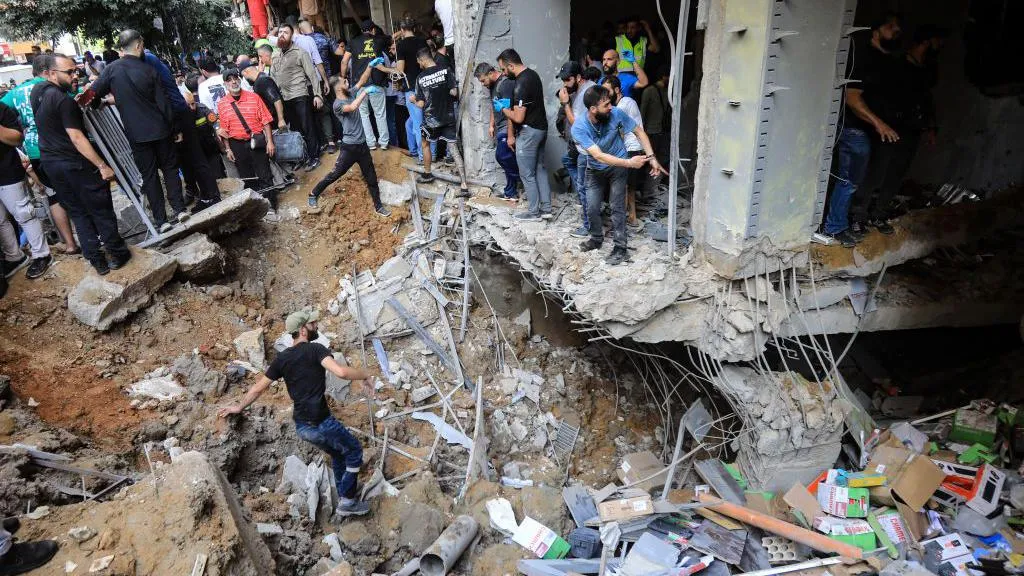An Israeli Airstrike in Beirut killed a top Hezbollah Commander, Raising Tensions and sparking Threats of Retaliation. Casualties include civilians.
In a significant escalation of violence in the Middle East, a top commander of Hezbollah was killed during an Israeli airstrike in Beirut, sparking widespread outrage and tension in the region. The strike occurred late at night on a busy residential street in the southern suburbs of the Lebanese capital, an area known for its strong Hezbollah presence. This incident marks a notable increase in Israeli military operations against Hezbollah, a group that has been a key player in the region’s complicated political and military dynamic

The airstrike targeted a vehicle carrying the senior commander, identified as Imad Mughniyeh’s successor, whose leadership role in the military wing of Hezbollah had made him a primary figure of interest for Israeli intelligence. Although initial reports emerged suggesting the possibility of several casualties, further assessments revealed that in addition to the commander, at least eight other individuals were killed in the airstrike. These included both Hezbollah operatives and bystanders, with civilian casualties a grim reminder of the absurdity of urban warfare. Among the injured, over twenty individuals were reported to have sustained injuries, with various levels of severity ranging from shrapnel wounds to psychological trauma induced by the sudden violence.
The Israeli Defense Forces: (IDF) confirmed the operation, stating that the target was involved in orchestrating attacks against Israeli citizens and was a key figure in Hezbollah’s network of military operations against Israel. The IDF issued a statement depicting the strike as a preemptive measure necessary for Israel’s national security, underlining the threat posed by Hezbollah’s increasing military capabilities and its alliance with Iran.
The response from Hezbollah was immediate and fierce. The group vowed to retaliate for what they called an “act of aggression” against Lebanon and its sovereignty. In an online statement, Hezbollah pledged to hold accountable those responsible for the airstrike, warning that the murder of their commander would not go unanswered. This declaration raised fears of an imminent escalation in hostilities, with the potential for renewed conflict in the region.
In the aftermath of the strike, tensions escalated across Lebanon, particularly in Shia neighborhoods where Hezbollah maintains considerable support. Security forces were mobilized to prevent protests from spiraling out of control. Despite these efforts, spontaneous gatherings erupted across the country, with hundreds taking to the streets to express their grief and anger. Some demonstrators carried placards condemning Israeli actions, while others called for unity against external threats.
International reactions to the airstrike varied, with some nations supporting Israel’s right to defend itself while others criticized the use of military force in civilian areas, highlighting the implications of such actions on the already fragile security dynamics in Lebanon and the broader region. The United Nations called for calm and urged both parties to de-escalate the situation, emphasizing the need for dialogue to prevent further violence
As the situation unfolded, analysts speculated about the possible repercussions of this incident on Hezbollah’s operations and Israeli security strategies in the region. Some experts suggested that this could lead Hezbollah to adopt more aggressive posturing against Israel, potentially resulting in increased rocket fire or targeted attacks against Israeli interests both within Lebanon and in the occupied territories.
The historical context of Israeli-Hezbollah relations adds a layer of complexity to this event. The two sides have a long-standing history of conflict, particularly the 2006 Lebanon War, which resulted in extensive destruction in Lebanon and a significant loss of life on both sides. The killing of the commander could reignite memories of that conflict, inflaming nationalistic sentiments and leading to calls for revenge from Hezbollah’s supporters.
As the death toll grew and the injured were taken to local hospitals, the Lebanese government faced mounting pressure to respond to the airstrike. Prime Minister Najib Mikati condemned the attack, branding it a violation of Lebanese sovereignty and an act of war. He called for an urgent meeting of the National Defense Council to assess the situation and formulate a strategic response.
With regional actors closely monitoring the developments, the possibility of drawing in other players into the conflict cannot be overlooked. Iran, a key ally of Hezbollah, has previously pledged support to the group in the event of a confrontation with Israel. If tensions escalate further, it may lead to a broader regional confrontation involving Iranian forces, further destabilizing the precarious balance in the Middle East.
In conclusion, the killing of the top Hezbollah commander in an Israeli airstrike has sent shockwaves through Lebanon and increased fears of renewed conflict. With multiple casualties and widespread condemnation, both Hezbollah and Israel find themselves at a critical juncture. The potential for retaliation looms large, and the consequences of this strike may resonate in the region for years to come. As governments, organizations, and individuals react to the fallout, the urgent need for a diplomatic resolution to the longstanding issues between these factions becomes increasingly apparent. The international community remains on high alert, hoping that restraint prevails to prevent an escalation into a wider conflict that has historically been difficult to conta
[…] The longstanding tension between Israel and Hezbollah has evolved significantly since the latter’s establishment in the early 1980s, largely as a response to the Israeli invasion of Lebanon. Initially formed to combat Israeli military presence, Hezbollah has since transformed into a formidable political and military entity in the region, bolstered by support from Iran and Syria. This shifting dynamic has led to a protracted cycle of conflicts, negotiations, and retaliatory actions spanning over three decades.https://rb.gy/b4zoam […]
[…] International Community Responds on Israeli air strikes […]